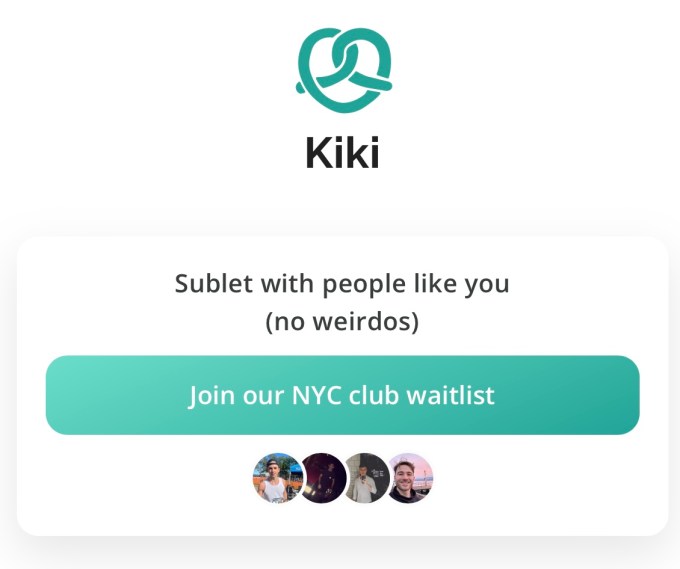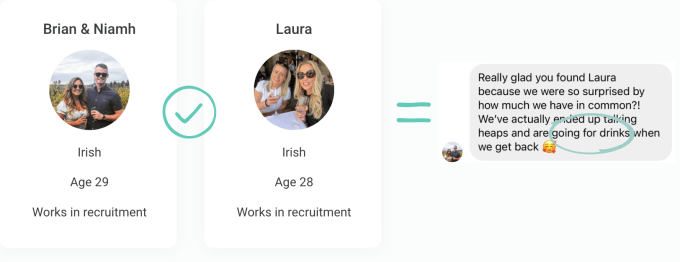Kiki (formerly EasyRent), a subletting startup that matches listers with people looking to rent for up to six months, recently closed a $6 million seed round, its co-founder Toby Thomas-Smith exclusively told TechCrunch. The funding will go toward Kiki’s upcoming relaunch in New York City this fall.
Blackbird Ventures led the round with $4.5 million, making it the second biggest seed check the VC firm has written. Kiki’s seed round also attracted various notable backers across the tech industry, including former Airbnb exec Harry Uffindell, Facebook Marketplace founder Bowen Pan, former Bumble exec Michelle Battersby, former Canva exec and founder of Phase One Ventures Mahesh Muralidhar, as well as ex-Uber execs Tyler Trerotola and Jaikumar Ganesh, among others.
“Kiki’s broader vision of building the world’s biggest ‘community-led marketplace’ is pretty special,” Pan said via an email to TechCrunch, adding that he had seen “a strong need” for a service like this while building Facebook Marketplace, which launched a section for apartment rentals in 2017. “I’m proud to make [Thomas-Smith] and his team my first personal angel investment.”
When more investment landlords are buying empty apartments to rent out on services like Airbnb, Kiki is aimed at everyday people that aren’t looking to make a profit. Instead, the app targets users who travel for months at a time and don’t want to lose money on rent while they’re away.
“We’re not taking away housing,” Thomas-Smith told us. “We’re using empty space that’s literally already there… we’re bringing money back to the locals.”
Kiki works similarly to dating apps since it matches listers with renters with similar likes and preferences. While this may seem unusual for a subletting service, Kiki wants to help listers — especially first-timers — feel comfortable letting a stranger stay in their home.
The app follows an invite-only “friend of friends” model to ensure people are vouched for and will hopefully respect someone else’s space. Users must link their Instagram accounts to be accepted. Thomas-Smith said there is a strict “no weirdos” policy, meaning users need to have at least a few Instagram followers and selfies to join. (Instagram is also where renter and lister communicate because Kiki doesn’t have a direct-messaging feature).
“[Kiki] is centered around people over property,” Thomas-Smith added. “It’s all about human psychology. How can someone go from being a stranger to a friend of a friend as quickly as possible?”
Kiki has the same profile format as Hinge, with a list of prompts that renters can choose from. For instance, “How would your friends describe you in one sentence?” “I go crazy for” and “This year, I really want to.” Listers are able to set criteria for their listing, such as minimum age or no smokers.
Kiki also has a management feature where users can keep track of on-time payments, secure deposit holdings and e-sign sublet agreements. For each listing, Kiki takes 10% of the rent price.
Thomas-Smith founded the company in 2018 while attending university in New Zealand and working for Airbnb.
“I was working for Airbnb cleaning toilets and discovered this whole short-term rental market,” Thomas-Smith said. “I learned that these properties were making all their profit over the summer, and then they would lose money over the winter. [I was] like, ‘How are these places sitting empty for almost half a year?’ It seemed crazy to me.”
He also discovered that all his college friends renting places for the school year were wasting money when they went home for breaks. To solve this problem, Thomas-Smith built an invite-only matchmaking service — originally called EasyRent — that allowed New Zealand-based students to rent out their places during the summer, mainly to other students coming into town for internships.
In 2021, when EasyRent gained enough traction, Thomas-Smith brought on Jack Montgomerie as co-founder and software engineer Alexander Nicholson to help expand its user base to a wider audience.
The startup closed a $230,000 (NZD) seed round in 2022 and launched in Sydney, Australia, to users in Bondi Beach. EasyRent filled 1,500 homes just in that one neighborhood alone.
Recently, the company has decided to sunset the app in New Zealand and Australia and focus its efforts on its NYC launch.
This October, Kiki is rolling out to one neighborhood to start — either East Village or Williamsburg. Interestingly enough, it will also only be available to Australians at launch. The company saw the most demand from Aussies, particularly those who moved to NYC and want to save on rent when they visit family abroad.
Users interested in signing up for the waitlist must submit their selfies along with their Instagram accounts. Kiki is accepting the top 10 people every week based on how many friends they invite and how many people share their Instagram story with @kikiclub.nyc tagged.
In the coming weeks, Kiki plans to gradually roll out to different neighborhoods and nationalities. It will be available to everyone in NYC in a few months.
Note that subletting an apartment in New York requires the landlord’s permission. If a tenant sublets without approval, the landlord may take legal action against them. A sublease in NYC must last for a minimum of 30 days.
Thomas-Smith said Kiki wants to expand to the top 10 cities in the U.S., including Boston, Los Angeles, San Francisco, Miami, Chicago, Philadelphia, Washington, DC, Seattle and Austin. With investors already lined up for a future Series A funding round, the startup also ambitiously plans to grow its team to 100 employees and launch in 20 cities in Europe by 2024.
from TechCrunch https://ift.tt/jLVh3Fo




Comments
Post a Comment